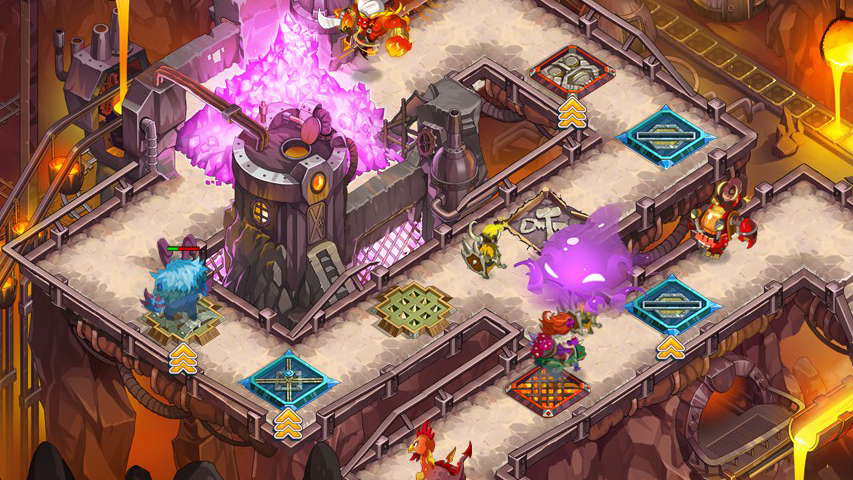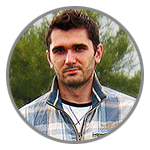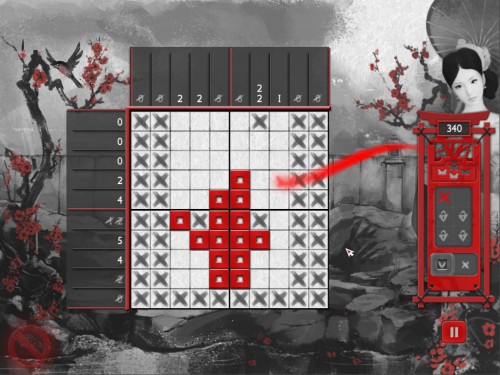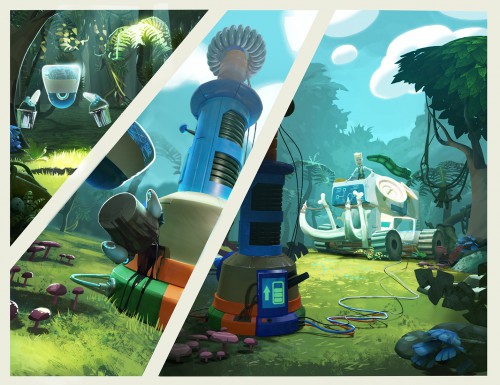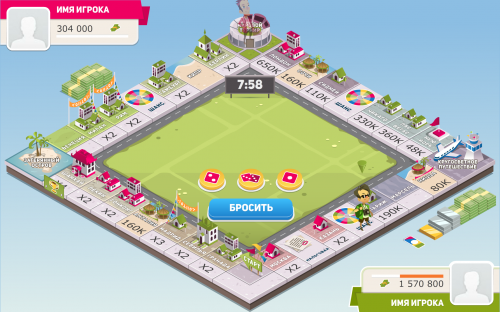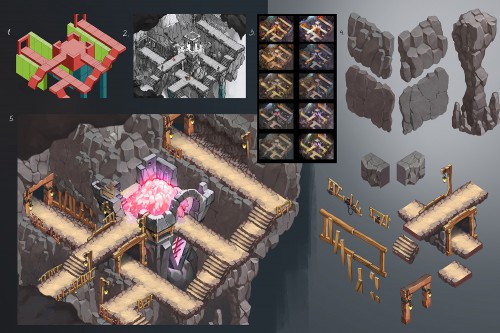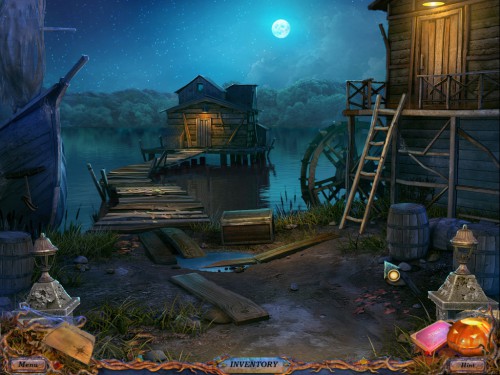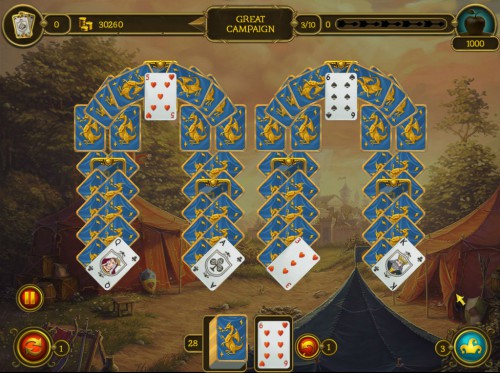We continue to publish materials in our “Who’s Who” series (recall, instead of posting game announcements from young and not only studios, we invite them to tell about themselves). This time we talked to the studio Creobit.
We talked with the general director of the studio – Ivan Parkhomenko.
Ivan Parkhomenko
App2Top: Hi! How did it all start?
Ivan: Hello! It started about five years ago. A group of people enthusiastically decided to make games in Krasnodar.
There is such a site, gamedev.ru . There is a forum there – “Gathering a team”. It started with an announcement on this forum, with the creation of a topic. We started doing some kind of quest, a small more or less permanent team of three or four people slowly gathered. In fact, there is a huge turnover with such projects. A person writes enthusiastically that he is ready, he is interested, and after a couple of days he does not respond anymore. Or in a week. He started doing something and then disappeared. In principle, some small number of people gathered. Basically, they were all young, students. And then we managed to move to the office and do it more professionally. And soon we will be four years old, we will celebrate.
App2Top: It always seemed to me that gamedev.ru – it’s more about hardcore developers. They are developing, for example, their own Fallout. And the company Creobit makes a lot of hidden, casual products. Initially, there was such a focus on casual, on things for a wider audience? Or was it done in some other way?
Ivan: Initially, the goal was to make casual products. In this message, it was said that a team is going to develop casual games. For several reasons it was. They are simpler, easier to start with. And it was clear that immediately doing Fallout is inadequate and hardly feasible. It’s probably easier to do something simple and understandable.
App2Top: Do I understand correctly that the task is to switch from casual games to more serious projects? Or did you still tell yourself that casual games are our favorite, and we will stay here?
Ivan: We do not consider our work as the creation of a specific game, or several games, or some genre. We see that there is such a profession – making games. And there are different audiences, different customers who want different things. Relatively speaking, there is a kitchen, and there is a chef on it. And he does not make dishes for himself, but people come to him, and his task is to feed the person who came to him tasty and satisfying. Cook what this person likes. Therefore, there are many genres, all genres are interesting. There are also a lot of settings, they are also all interesting. There is no restriction that we only do this. We are interested in how games are arranged, how people play from the point of view of psychology. What are the game mechanics, how are they related to some human thought processes. Gradual growth, development, addition of new projects and genres that are more complex from the point of view of development. Because there is also such a feature – it is true for all small cities, not only, I think, for Russia, but probably all over the world. The industry does not exist in the city, for example, Syzran or Ust-Labinsk. In such small towns there are no people, no experience. And it doesn’t work to do Fallout right away. The task is, among other things, to gain a foothold, to create a certain foundation on the basis of which it is possible to further increase complexity and gradually improve quality. And to do this, you need to recruit young people, learn gradually, increase the experience together. Someone stays in the company after that, he is such a carrier of experience. New people come, and they learn much faster and better. And this is how the industry is being formed inside the city, inside our studio specifically.
Asian Riddles
App2Top: I understand correctly, do you consider your company as a school? Relatively speaking, the University of Industry in Krasnodar?
Ivan: There is no such thing – we do not make a school out of the company. We just understand that the company needs to develop. And the people who are in it must learn to meet the requirements of a changing market, to know the platforms that are emerging. To do something modern. The company needs it rather than the industry. And the fact that the industry gets something of its own is rather a by-product. If the goals were set specifically in the development of the industry, then it would be more correct to do some training courses, seminars, and events. We develop the industry only by developing ourselves in it.
App2Top: Listen, maybe I didn’t quite get it right… The whole range of games that you produce can be called not particularly difficult. And their development is to some extent aimed at developing employees and then making a big game?
Ivan: Not quite right. I will draw an analogy, again, with the cook. The chef’s task is not to cook one dish in the final, which will be the crown of his career, but to be able to cook different food, to be able to cook delicious for different situations. And here are small games – they are specific, they have their own audience, their own characteristics. And we do them. People, including, get experience on them. This does not mean that we do them carelessly. In any case, we are doing them as efficiently as we can now and as resources allow. At the same time, a person gets experience, and over time he can make more complex games. And we have another opportunity, another genre that we can do. And a young man will come to the vacant place again, he will be given the experience, the knowledge that has already accumulated in this genre. And he will start his journey inside the company with these small projects. And those people who have already gained experience and built up work with these genres can take the next step and do some other projects. Or stay on those projects if they are interested in them.
Art from DayD
App2Top: You mentioned the metaphor with the chef and said that his goal is not to create a big dish. Is there really no dream game? Such, you know, not that the ultimate goal… If life is divided into check points, then this is a check point called a “Big Project”. Is it not there or is it still there?
Ivan: The dream game is subjective. Some people like it, some don’t. There is, relatively speaking, my dream game, which I might have done. But it has nothing to do with the studio. The task of the studio is to provide a place for people so that they can create games. If I have a desire to do something, then I need to do it at home, or something else… There are different requirements. If we set a task to make a successful project, then we focus on the audience for whom we are doing it. If we make a dream game for ourselves, then we focus on our goals and objectives. It will not necessarily be a successful project that someone will like. We are based on the requests of the audience. We are studying how best to do for her.
App2Top: We started saying that you are targeting a casual audience. But a casual audience is often a very broad concept. A lot of people enter there. I looked at the company’s portfolio, and it seemed very diversified. At the same time, there are other companies, like Big Fish or King, which also focus on a casual audience, but they have a certain focus. Big Fish had hiddens until recently, now it’s a casino. King had match-3s until recently. You have such a strong differentiation: there are puzzles, there are children’s, there are hiddens, there are puzzles resembling crosswords, there are “lock captures”. Was there no desire to concentrate on a certain casual genre in order to achieve professionalism in one direction all the time?
Ivan: These are different business models. You can do it in different ways, based on what happens, based on how you see the development of the business and the company. In this case, initially there was such a vision that we do different things, we try. For us, they weren’t really that different. And yes, the gameplay is different, but the process of creating the game solitaire, tower defense or hidden object is very similar. It is from the point of view of the organization of work. From the player’s point of view, they are certainly different. And this will divide the players into different target groups.
We are just implementing the international project management standard, PMI PMBoK, in parallel. And so, in fact, it allows you to systematize this area and approach the development of games, regardless of which project. You know how to do it anyway.
Business Tour
App2Top: Could you tell me a little more about this standard?
Ivan: There is an institute that is engaged in the standardization of management. They have a classification – project manager, program manager, portfolio manager and so on. They gathered various managers from completely different fields of activity: from construction, from advertising, from games, and so on. And we tried to highlight, find something in common that allows us to somehow determine the work of the project manager. Who he is, what he does and how. There are specifications, standards. The current version is the fifth. It also includes a flexible software development methodology, which is popular with game developers and programmers. And this is some kind of “talmud of knowledge” to which you can turn and thereby adopt a successful experience. Again, speaking of experience, there is practically no culture of management, management of international level in small towns. Therefore, taking some standard or language as a basis, we get access to the experience that is embedded in this knowledge and this language.
App2Top: Did you immediately switch to this model, or were there any “rakes”?
Ivan: No, not immediately, but gradually, evolutionarily. And even now we have just begun to implement and work on some parts of the knowledge that we have received. Initially, there was one vision of what to do and develop. Then, as we gained experience and developed each of the specialists, we learned to do something better, something more efficiently. For some reason, they refused, they added something, we could not implement something from the first time. For example, some kind of process. A year later, we “grew up” to it, and we managed to implement it into work. For example, young teams often have such problems – either poor documentation, or poor documentation of the code, or lack of technical specifications, and so on. And, perhaps, young teams do not need it. Plus, there are different development methodologies, where the number of documents decreases and the amount of communication between people increases. Gradually, every week we experiment, try something, add, improve, measure indicators – what works and what does not work.
Art from Gnumz
App2Top: Going back to the history of the company, you said that you will soon be four years old. And how long was the period from the moment when you gathered on gamedev.ru and before you got into the office?
Ivan: The period took about two years. It took most of all, of course, motivation to continue moving towards the goal for two years. This is probably the specifics of the Russian community – there is not much support on the same forums from more experienced people. It looks more like either banter or some kind of criticism, and not always constructive. Most likely, most of the projects also end because of this. If there had been some kind of community support culture aimed specifically at completing projects, then perhaps there would have been other results. But this is a philosophical question.
So – there was one project, in fact, on which we worked all the time. He went through different stages. The engine changed, the art changed, the script changed – because the development was long.
App2Top: And not a budget one. That is, not for money. Or have you already invested something?
Ivan: No, everything is on enthusiasm, there was no money. That is, in their free time (everyone either worked or studied) we gathered in the evenings and did something.
App2Top: When we moved to the office, did it get easier? That is, it happened that we moved into the office and exhaled, told ourselves that now we are developers, now we don’t have to work at night.
Ivan: We have become more motivated. That is, finally the dream came true, we began to devote all our time to this. At that time, I worked about 16 hours a day, seven days a week. And this has been going on for one and a half to two years. Not that it was hard for me! I liked what I was doing too much. And so I stayed there and so on, but from the point of view of the inner feeling, it was a breath of fresh air. Finally made a step into the professionals.
Shadows
App2Top: Took shape around the same time, it turns out?
Ivan: Well, yes, we got registered and sat down in the office.
App2Top: Can you tell us about the main success? What is the flagship of the studio, what are you proud of? What is the best project, and why do you think it was the best success?
Ivan: In my opinion, the success of the studio and the main flagship is still a team. It was the most difficult thing there is. And the projects are all different and all are valuable in different ways. We have made about 100 unique projects. But the main thing is that after all, those people who gathered, gather and remain in the team. This is the most difficult from the point of view of organization and existence in general. We need to understand that we are not Moscow and not St. Petersburg. Everything works quite differently here.
App2Top: Do you mean including personnel policy?
Ivan: Yes, absolutely.
App2Top: Look, if it started to form, I’m not talking in Krasnodar, – in Syktyvkar, for example, a studio. What should she pay attention to? How do I start forming my team?
Ivan: I would initially recommend paying attention to the goals, so that the team defines the goal for itself from the very beginning, what it wants to achieve, get.
Knight Solitaire
App2Top: And what did you want?
Ivan: Initially we wanted to make games. We wanted to play games. There was no project that we wanted to implement. We wanted to do some kind of project that would allow us to make games, and we would communicate with people there. Based on what brought us closest to the goal, we chose that project. Here is a link to the forum where it all started. There’s even a date here, November 27, 2008. Seven years ago, it turns out. And at the end there, in principle, somewhere there is even a link to the released project – which eventually turned out.
App2Top: That is, it still turns out that the goal was to create a specific product? That is, in order to rally the team, it was necessary to create a project that would sell well and allow you to switch to full-time?
Ivan: Look, it’s just a question of what it turns out. There is a team that wants to create a game of some kind. So they created it, let’s say. And what do they do next? That is, it is a question of more existence of the team further. If there is no goal, then why does the team exist if the game has already been made? Or there is a goal to make a new game. But where is the guarantee that, for example, if the number of people is more than three, everyone will like the new goal? And as a rule, the team breaks up because it does not find a common goal that everyone is ready to go to.
App2Top: But do you agree that the goal of making games is very abstract? Everyone has their own idea of what the game should be. Some have a goal to earn a million, others have a goal to get the game into the tops in the US, and so on.
Ivan: I think this is a very specific question, and it is a question of choosing a profession. What profession do you want to do? Making games. What specialization? Management, artist, 3D artist, programmer. That’s all. If a person chooses a profession related to games, then this is one thing. If a person wants to do a specific thing, then it’s probably more “indie” and development. Either I made a game and finished it all, or I did other things. Or a person works in his profession, and at the same time makes a game. Well, that’s exactly the question, in fact, in choosing a profession.
App2Top: I see. Thanks for the interview.
Interviewed by: Alexander Semenov
Transcribed by: Irina Smirnova
You will be able to learn about the latest trends in the gaming industry first-hand, personally meet and discuss working issues with leading companies in the game development and publishing market at White Nights Moscow 2015, which will be held on October 13-14.

